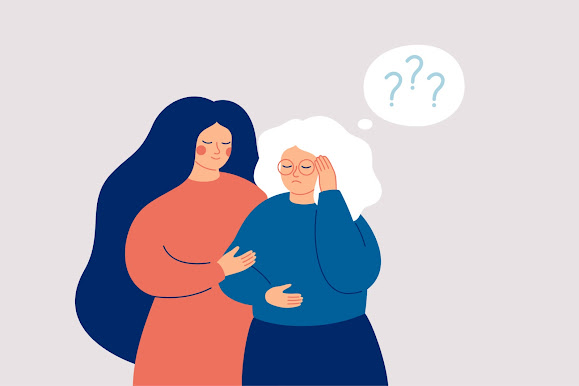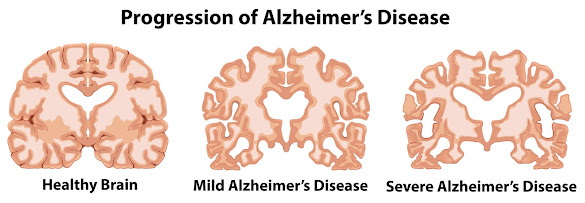What is Alzheimer's Disease Dementia?
Alzheimer disease is a brain disorder that causes memory and cognitive abilities to deteriorate over time. The disease of Alzheimer is a kind of dementia. Dementia typically starts in persons over the age of 65, but it may develop in those younger than 40 who have a family history or genes that trigger Alzheimer's disease.
Types of Alzheimer
There are several types of Alzheimer’s disease.
One is called early onset and it mostly affects people in their 30s and 40s.
Another type of Alzheimer’s disease is called late onset and it mainly affects
those who are over the age of 65.
Early onset Alzheimer's:
This kind affects individuals under the age of
65. They are often diagnosed in their 40s or 50s. It is more likely to be
associated with unusual symptoms, and cognitive tests indicate impaired
executive and visuospatial functioning and praxis, but with less noticeable
memory impairment.
Late onset Alzheimer's:
This is the most prevalent manifestation of the
illness. It is believed to be affected by processes associated with ageing.
Researchers have discovered that late-onset Alzheimer's disease has a larger
effect on memory, whether of recent events or of well-consolidated knowledge,
while some instances show just decreased recognition.
Facts about Alzheimer’s Disease
Alzheimer's disease is now affecting about 5 million individuals in the United States.
- There are 500K individuals under the age of 65 in the United States..
- In the United States, it is the sixth largest cause of
death.
- By 2030, 7.7 million people will be affected by
Alzheimer's disease.
- One in every eight people over the age of 65 has
Alzheimer's disease.
- Alzheimer's disease affects almost one in every two
people over the age of 85.
- Someone is diagnosed with Alzheimer's disease every 70 seconds, according to the Alzheimer's Association.
Difference Between Dementia and Alzheimer
All memory problems are not dementia. A person
with dementia may have trouble remembering people's names and faces, for
example, but that's not Alzheimer's disease. Alzheimer's disease (which kills
brain cells) causes mental decline and even loss of physical abilities that
cause problems with daily life. In contrast, memory problems that do not lead
to dementia are called normal age-related memory loss.
Causes
Most cases of dementia are caused by plaque build-up in the brain's neural networks. Plaque may form due to brain injury or abnormal brain growth during development. When plaque builds up, it blocks off parts of the brain. Alzheimer's disease usually begins by destroying neurons and their connections in areas of the brain that are important in memory, such as the entorhinal cortex and the hippocampus, in the early stages.
Later on, it has an effect on the regions of the cerebral cortex that are responsible for language, thinking, and social behavior, among other things.
This causes brain cells to die off, and the victim may begin to experience memory loss.
Symptoms
Alzheimer's disease is characterised by progressive memory loss. The first symptoms of Alzheimer's disease are trouble recalling recent events or discussions. When Alzheimer's disease develops, memory problems get worse, and additional symptoms appear.
It is possible that a person who is suffering from
Alzheimer's disease may be aware that they are having trouble recalling things
and organising their thoughts at first. It is possible that a family member or
acquaintance may be more aware of the symptoms as they intensify.
Symptoms vary from moderate to severe and involve the following manifestations:
· Memory loss
· Poor judgment leading to bad decisions
· Loss of spontaneity and the ability to take the initiative
· Memory loss and confusion are becoming more prevalent
· Inability to pick up fresh information
· Language difficulty as well as difficulties with reading,
writing, and dealing with numbers are common.
· Inability to communicate effectively
· Loss of weight
· Seizures
· Infection of the skin.
Living with Alzheimer
It is estimated that 5.7 million persons suffer from Alzheimer's disease in the USA live, but one out of every three older Americans aged over 65 have this illness. There is no treatment and hence no technique of slowing or stopping the disease.
Alzheimer's disease is sixth on the list of leading causes of death in the United States. The CDC states that in 2014, over
five million Americans will be living with Alzheimer's disease a nd it is
estimated in the next 15 years that this figure will practically treble.
Indeed, approximately one out of every 14 American people will become
Alzheimer's throughout their lives.
Dementia Wandering
Many Alzheimer's patients and others who suffer from degenerative diseases wander and get disoriented on a regular basis. People with Alzheimer's disease lose their capacity to identify familiar locations and persons. The early stages of dementia may cause this kind of behaviour. Dementia patients often wander or become lost or confused (disorientated) about where they are. Depending on the stage of the disease, this may occur.
Mild Alzheimer's Disease
When Alzheimer's disease is in its mild stage, a
person may be able to operate independently. He or she may continue to drive,
work, and participate in social events. The individual may still have memory
lapses, such as forgetting familiar phrases or forgetting where common place
items are located, despite this.
Alzheimer's Clinical Trial
Even though there is no cure for Alzheimer's,
researchers are actively researching ways to prevent, treat or delay the
disease. Russian scientists have developed chemical compounds that may slow the
death of neurons in patients suffering from Alzheimer's disease, Parkinson's
disease, and other serious brain disorders. These compounds have the potential
to make significant advances in the treatment of neurodegenerative diseases. Health professionals have dedicated all of their effort to discovering treatments for this illness.
Alzheimer's Diagnosis
Alzheimer's disease is notoriously difficult to
diagnose due to the similarity of its symptoms to those of other diseases.
Alzheimer's disease is diagnosed when a person's symptoms do not react to memory
or thinking tests but are ascribed to Alzheimer's disease due to other
variables such as age, medical history, behavior, and family history. Doctors
perform tests to evaluate memory impairment and other cognitive abilities,
functional abilities, and behavioral abnormalities in order to diagnose
Alzheimer's dementia. Additionally, they conduct a battery of tests to rule out
any other potential reasons of impairment.
Treatment
While there is currently no cure for Alzheimer's
disease, there are therapies that may help reduce the illness's progression.
Aricept, a medicine, may help delay the disease's development, and some
lifestyle modifications can help mitigate the disease's symptoms as well. These
include developing skills for managing and avoiding stressful circumstances
(such as lengthy travel), as well as developing regular hobbies and routines.
Dementia caused by ageing As you age, your brain loses its capacity to generate
new nerve cells (nerve cells are brain cells that produce brain chemicals). As
a consequence, your memory begins to deteriorate. Around 30% of individuals
over the age of 65 suffer from memory loss. Being self-sufficient Around 30% of
those over the age of 85 live alone.
Medicine named Donanemab improved the composite
score for cognition and capacity to conduct activities of daily living in
individuals with early Alzheimer's disease.
Genetic Testing for Alzheimer's
While a blood test may identify which APOE
alleles an individual has, it cannot predict who will get Alzheimer's disease
and who will not. Genetic testing is available for APOE-e4 and other rare
Alzheimer's disease genes. However, doctors currently do not recommend regular
genetic testing for Alzheimer's disease. Testing for APOE-e4 is sometimes
included in research studies.
FAQS
Q.What is the difference between dementia and Alzheimer's disease?
A. Dementia is a broad word that refers to a
decrease in mental capacity that is severe enough to interfere with one's
ability to perform everyday tasks. Alzheimer's disease is the most prevalent
cause of dementia among the elderly. Alzheimer's disease is a particular kind
of illness. Dementia is not a health disease.
Q. Is Alzheimer's disease a part of dementia?
A. Alzheimer's disease is a kind of dementia it
is not a specific type of dementia; it affects memory, thinking, and behaviour
in the same way as other types of dementia. Eventually, the symptoms become
severe enough to interfere with everyday activities.
Q. How is Alzheimer's dementia caused?
A. In most instances of dementia, plaque
build-up in the brain's neuronal networks is the underlying reason. Plaque may
form as a result of a brain injury or aberrant brain growth that occurs
throughout childhood. When plaque accumulates in the brain, it causes portions
of the brain to become blocked. This results in the death of brain cells, and
the sufferer may begin to experience memory loss as a result.
Q. How fast does Alzheimer's dementia progress?
A. The pace at which Alzheimer's disease
progresses may vary significantly. As reported by the Mayo Clinic, individuals
who have been diagnosed with Alzheimer's disease live an average of three to
eleven years after being diagnosed with the illness. Some people with the
illness, on the other hand, survive for two decades or more.
Q. At what point do dementia patients need 24 hour care?
A. For those suffering from Alzheimer's disease
in their latter stages, it becomes essential to offer 24-hour monitoring in
order to ensure the person's safety. As the illness advances into the late
stages, the need for round-the-clock care becomes more important.
Q. Which is worse dementia or Alzheimer's?
A. When it comes to memory, everyday activities,
and communication skills, dementia is an umbrella word that describes a variety
of symptoms that may manifest themselves in many ways. Alzheimer's disease is
the most prevalent form of dementia and affects about 5.7 million people
worldwide. Alzheimer's disease progresses over time and has a negative impact
on memory, language, and thinking.
Q. What you should not say to someone with dementia?
A. Some things to avoid saying to someone
suffering from dementia are as follows: You are wrong, they passed away, Do you
recognise.
Q. Does dementia get worse fast?
A. Physical changes in the brain cause dementia,
which is a degenerative illness that worsens with time. Dementia develops as a
result of these physical changes. For some individuals, dementia develops
quickly, while for others, it takes years before the disease reaches a severe
level.
CONCLUSION
Alzheimer's disease is a progressive brain
illness that gradually impairs memory and reasoning abilities. Patients
suffering from alzheimer’s disease dementia often wander, get disoriented, or
lose track of where they are. Alzheimer's disease is sixth on the list of
leading causes of death in the United States. According to the Centers for
Illness Control and Prevention, 7.7 million individuals would be afflicted by
the disease by 2030. Russian scientists are actively investigating methods of
slowing the death of neurons in individuals suffering from Alzheimer's disease,
Parkinson's disease, and other severe brain diseases. If you have this illness, you should consult with a qualified doctor.



Comments
Post a Comment